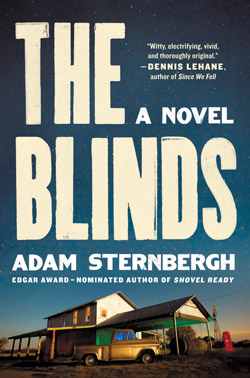 The Blinds by Adam Sternbergh is a unique thriller that mixes elements of science fiction, Westerns, and mystery to create a truly wild ride (available August 1, 2017).
The Blinds by Adam Sternbergh is a unique thriller that mixes elements of science fiction, Westerns, and mystery to create a truly wild ride (available August 1, 2017).
Despite being set in a community that is baking out in the open in the hot Texas sun, The Blinds by Adam Sternbergh is one of the more claustrophobic mysteries that I’ve ever read. That’s because the weight of secrets hangs over everything, pressing down on the town, the inhabitants, and those that seek to destroy it.
On the surface, the Blinds (formal name Caesura) is a quiet, out-of-the way place in Texas where residents want to be left alone. The truth is they can never leave, as evidenced by the fence that surrounds it. They’re either violent criminals who became state’s witnesses or relocated innocents in the Witness Protection Program—but no one knows which. A new scientific procedure has allowed a private corporation (with a government contract) to erase the memories of their previous lives, particularly anything surrounding why they are there. After the memory wipe, they arrive at the Blinds for orientation, usually given by Deputy Robinson.
“We have three rules, and those three rules must always be respected.” Robinson writes THREE RULES on the whiteboard. Under that, he writes:
- NO VISITORS
- NO CONTACT
- NO RETURN
He turns back to the four newcomers. “No visitors—that should be self-explanatory
Whoever you knew, or think you knew, or half-remember maybe knowing in your previous life, you will never see those people again. Fortunately, most of those people probably want to murder you.” No laughs. That’s okay, Robinson thinks, that’s joke’s always hit or miss.
Initially, the story suggests the reader will mainly follow Sheriff Cooper (yes, meant to evoke Gary) in his investigation of two violent deaths in the Blinds, a puzzle because no one has a gun except Cooper and his is always unloaded. But soon, the narrative shifts under the reader’s feet, and the book delves into the lives of the other residents of the Blinds—particularly Fran, a woman Cooper had an affair with after she came to the Blinds, and her eight-year-old son, Isaac, who she was pregnant with before she arrived. Fran, of course, doesn’t remember who the father of her son is, but she worries about Isaac’s future in a place where he’s the only child.
The omniscient narrator also glimpses into the minds of both of Cooper’s deputies, several of the residents, and near the end, one of the interlopers who’ve come to tear the community’s fragile existence apart. There is—as befits as modern Western—a confrontation in the middle of the dusty main street, with the sun burning down as Cooper tries to protect Fran, Isaac, and the other remaining residents.
Sternbergh’s skill in illuminating the actions and thoughts of the worst of humanity is evident. He raises the question of whether anyone can truly be redeemed even if they don’t remember their crimes. Carrying the past—even if one doesn’t remember it—is not an easy thing, and neither is living a life without knowing who you truly are. Which one among us would choose to remember their worst acts if they could forget them? But the residents of the Blinds only know they did something horrible (probably) but not what it was. Are they whole unless they find out, or are they better off not knowing?
And yet, as much as I enjoyed reading the book, I closed it with questions of story and some uneasiness. The premise is something out of science fiction, but it works because the world built around that concept is initially well-grounded in the residents’ reactions, Cooper’s need to protect, and the others' need to try to atone for what they had done. And then, the interlopers/mercenaries arrive to basically destroy the town, and my suspension of disbelief tipped sideways because the narrative throws out that subtlety and grounded approach for moments of incredible violence committed by killers that even I found over the top. (I can’t say more without spoilers, but let’s just say there seems to be a huge number of sociopathic individuals alive in this world.)
There are also a few dangling threads that didn’t seem to have an explanation at the end, such as the revelation about how some members of the Blinds communicate with the outside world and a mystery surrounding the deaths of two residents who ran away. That’s touched on in the beginning but not fully explored.
The ending seems to include the promise of a sequel, and I’m not quite sure how I feel about that. The story seems to have said what it needed to say. And what it said will leave me pondering about the nature of crime, evil, and redemption for some time.
To learn more or order a copy, visit:
Corrina Lawson is a writer, mom, geek and superhero, though not always all four on the same day. She is a senior editor of the GeekMom blog at Wired and the author of a superhero romance series and an alternate history series featuring Romans and Vikings in ancient North America. She has been a comic book geek all her life and often dreamed of growing up to be Lois Lane.

In 2021, police received complaints from 137,956 women – which breaks down to about one every four minutes. It’s an increase of 27% from 2016 when 110,434 women sought police help.